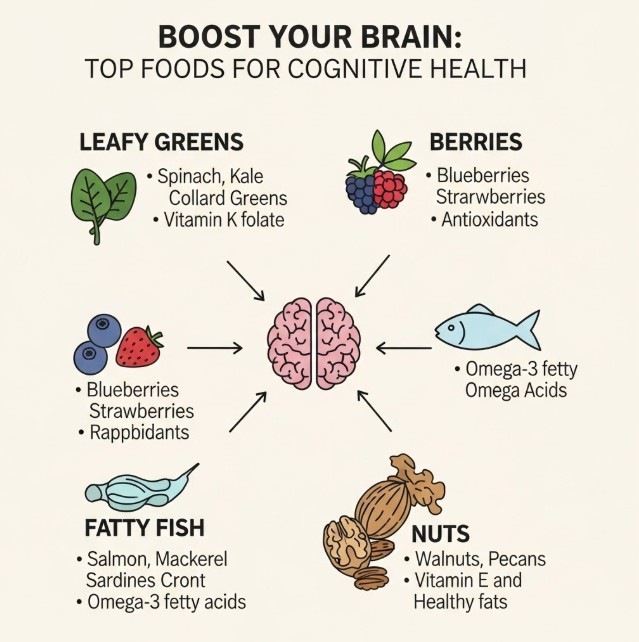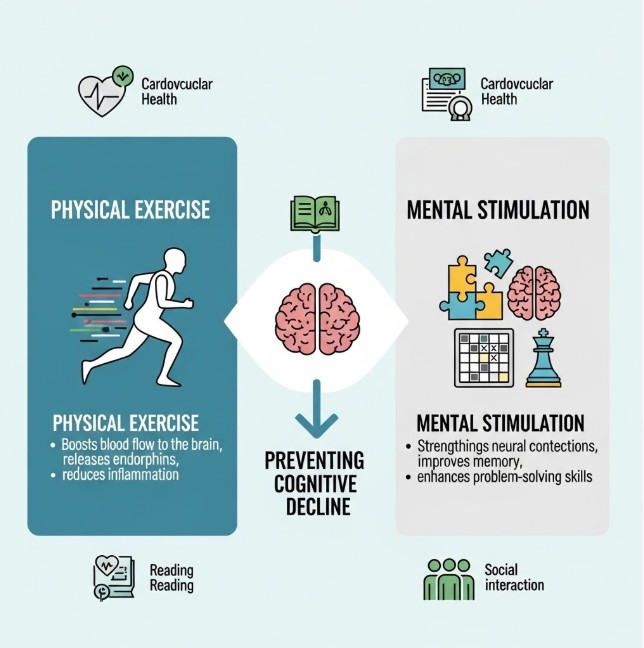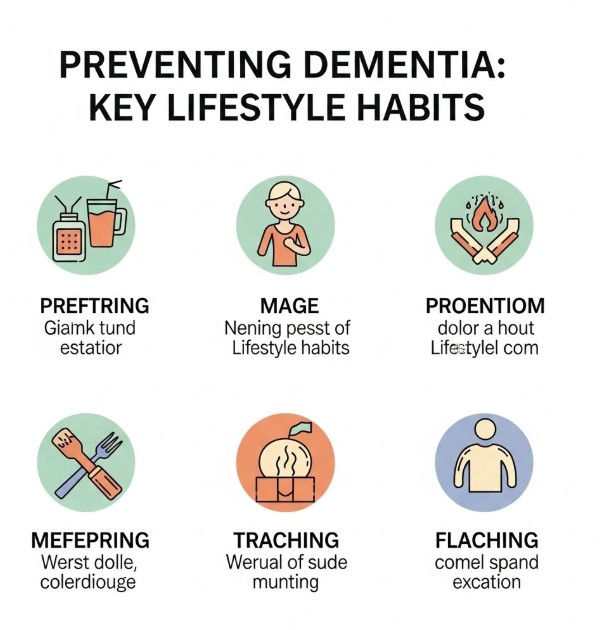
How to Avoid Dementia and Alzheimer’s: Science-Backed Tips
Table of Contents
Dementia and Alzheimer’s disease are two of the fastest-rising medical conditions in the world, affecting millions of lives and burdening healthcare systems and families. Lifestyle-related disorders, the environment, and even constant stress are some of the causes of this worrying trend.
While both diseases have long been associated with advanced age, science now shows that brain well-being is established much earlier in life. That means prevention doesn’t begin at retirement but in everyday choices about diet, exercise, and mental activity.
If you’ve ever wondered how to avoid dementia, learning science-based, practical tips is vital.
Be Aware of Dementia and Alzheimer’s Disease

Dementia is not a single illness but a broad group of symptoms that include memory loss, confusion, and difficulty in reasoning. The most common form of dementia is Alzheimer’s disease, which accounts for around 60–80% of dementia.
Unlike vascular dementia, characterized by a reduced blood supply to the brain, or Lewy body dementia, whose initial feature is motor impairment, Alzheimer’s disease is characterized by persistent degeneration of nerve cells, amyloid plaque deposits, and tau tangles.
It is essential to recognize these distinctions as they determine disease course and treatment strategy. Understanding the degree of dementia is important for reducing dementia risk factors.
Why Early Prevention Is So Important
Alzheimer’s Association emphasizes that lifestyle modification can have a measurable effect years before symptoms are apparent. From their findings, “what’s good for the heart is good for the brain,” we can say that activities like physical activity, healthy eating, and blood pressure management have long-lasting effects on cognitive health. Such a finding underpins the importance of preventive measures across all age ranges, not just older individuals.
By establishing protective habits early in life, such as consistent exercise, mental training through learning, and social engagement, individuals can protect attention, speed up thinking, and strengthen long-term memory. Adopting these habits is an investment in future mental sharpness and the quality of life.
Evidence-Based Lifestyle Habits to Prevent Cognitive Decline

- Healthy diet (Mediterranean, MIND)
Nutrition governs brain health. Research identifies the Mediterranean and MIND diets as two of the most neuroprotective diets. Rich in leafy greens, berries, whole grains, nuts, and olive oil, these diets not only enhance blood flow and lower inflammation but also directly improve memory and rational thought.
Unlike sporadic efforts to “eat better,” adopting a diet mindfully equates to a steady supply of long-term cognitive health benefits. For those who seek tips on how to improve short-term memory, studies show that diets high in antioxidants, omega-3 fatty acids, and limiting intake of processed sugars work.
- Physical Exercise
Physical exercise is not just an adaptive reaction to aging but rather one of the strongest indicators of continued brain function. Aerobic exercise, resistance training, and even simple walking enhance blood flow, stimulate growth factors, and reduce toxic protein accumulation in the brain. A good training session protects neural networks from failure. Experts emphasize that frequency is more critical than intensity because frequent routines create both cardiovascular adaptation and mental resilience with time.
- Cognitive Stimulation and Social Interaction
The brain thrives on challenge. Problem-solving training, language learning, or digital cognitive tools with game-like features all work to train the brain. Social interaction, also essential, serves to guard against isolation and maintain emotional resilience. Human interaction encourages active thinking and supports memory consolidation.
Again and again, studies have shown that socially active individuals can maintain mental capacity well into old age. In combination, mental training and meaningful contact are a strong defense shield against decline and proactive action for individuals interested in learning how to avoid Alzheimer’s and dementia.
Medical and Nutritional Perspectives

- Sleep Quality and Stress Regulation
Good sleep and proper management of stress are the cornerstones of cognitive decline prevention. The brain enhances memory creation and eliminates neurotoxic trash, such as beta-amyloid proteins that lead to Alzheimer’s disease, during deep sleep. Periodic efforts at better rest, such as grabbing the extra hours of rest, work much less effectively than established sleep periods and conscious conditions that permit unbroken sleep cycles.
Persistent stress, on the other hand, results in elevated cortisol levels, which weaken the hippocampus and long-term memory. Mindfulness training, meditation, and controlled breathing are evidence-based interventions for reducing stress reactivity and enhancing mental clarity, a vital aspect of any brain-conscious lifestyle.
- Management of Blood Pressure, Control of Diabetes, Cardiovascular Health
Emerging evidence shows that brain function is closely linked with the vascular system. Hypertension, diabetes, and other cardiovascular disorders are risk factors for vascular dementia as well as Alzheimer’s. Ongoing monitoring and control of these risk factors with medications, regular clinic visits, and lifestyle habits for brain health, like a proper diet and regular exercise, can greatly help build cognitive resilience.
- Lithium Deficiency and Alzheimer’s Disease
Surprisingly, new research has suggested that there may be a link between a lithium deficiency and Alzheimer’s disease. Lithium deficiency, an endogenous trace mineral present in drinking water and certain foods, is possibly a causative factor in the formation of toxic proteins in the brain and accelerated neurodegeneration. While further studies are ongoing, preliminary information suggests that providing sufficient lithium supplementation is an adjunct therapy for the prevention of Alzheimer’s. Nutritional guidance and cautious contact with healthcare providers are recommended to safely investigate this new area.
Taken together, these results validate that it is not a single step that stops cognitive deterioration but a multifaceted approach. Sleep patterns, stress management, regulation of metabolic and cardiovascular processes, and tracking for micronutrient balance all add up to protect neural networks, memory, and long-term mental acuity. Integrating these empirically supported interventions into everyday life enables an individual to build strength to resist age-related loss.
Activities Reducing Daily Risk
- Brain-Stimulating Activities (Puzzles, Language Learning)
Exercising the brain extensively on challenging activities is likely to be the best dementia prevention tip. Puzzles, strategy games, and learning a new language trigger networks in the brain. It results in greater mental flexibility and rich connectivity among connections that can help with problem-solving. Brain activities may be done at home or in groups, and social interaction is a bonus as the brain works. Even short, day-to-day tasks in intensive environments can improve memory storage and processing speed to a degree imperceptible but real.
Consistency is the prime key to huge gains. Random efforts will not bring detectable results, but integrating these exercises into routine keeps one proactively distant from Alzheimer’s. Over time, such brain-improving systems develop adaptive thinking, enhance concentration, and enable learning over a lifetime, rendering the brain resistant to age-related alterations.
- Digital Detox and Toxin Avoidance
Steering clear of exposure to digital distractions and environmental pollutants is another step that cannot be ignored. Too much screen time has the potential to cause reactive rather than reflective processing. It means that the brain responds quickly to frequent stimuli rather than engaging in deep, reflective thinking. It reduces the brain’s ability to concentrate and retain data. Toxins, heavy metals, and processed chemicals in products used at home may initiate oxidative stress that could accelerate cognitive aging.
Device breaks, walking outside, and utilizing non-toxic cleaning products are intelligent plans for protecting against cognitive impairment. The inclusion of these routines in one’s everyday practice not only allows the brain to recover and reload but also gives immunity to the long-term consequences of modern-day environmental toxins. Overall, these routines are an important part of daily practices that keep the brain healthy and optimize long-term cognitive function.
- Early Screening and Routine Checkup
The routine checkup provides an opportunity for screening for important risk factors such as blood pressure, cholesterol, and blood glucose, all of which impact cognitive function. Early detection also provides an opportunity to avoid Alzheimer’s symptoms and prevent long-term neurologic damage. During the clinic visits, it is possible to request lifestyle modification and receive a personalized improvement plan from physicians.
Cognitive screening at checkups will identify subtle decline before it becomes significant. Scheduled screenings and health monitoring are two of the easiest dementia prevention tips, giving individuals control of their cognitive future and trust in daily brain health strategies.
Consistency and Integration Into Daily Life
The optimum daily routines are habitual and not impromptu. Combining exercise, cognitive activation, social contact, and dietary benefits into your regimen boosts neural connections and constructs brain resilience.
Even tiny, thoughtful actions—like a 20-minute puzzle break, learning a new language, or walking outside for a few minutes—can collectively be powerful protection mechanisms. Systematized over time, these brain-nourishing habits create a brain-friendly lifestyle, improving memory, focus, and adaptive thinking and significantly lowering the risk for age-related cognitive impairment.
What You Can Do Today
The building block of a healthy brain begins with integrating organized routines into your life. Start the day with mental exercise, like solving puzzles, strategy games, or acquiring a new language that will challenge neural networks and build memory and logic. Add to this regular physical exercise, including aerobic exercise or resistance training, to pump blood and provide neuroprotective effects. Diet works too—shifting toward a Mediterranean- or MIND-dominant diet rich in plentiful leafy greens, berries, whole grains, and good fats promotes long-term brain power.
Similarly important is social interaction and stress reduction. Regular interaction with family or a social group activates the mind, while meditation, mindfulness training, or daily journaling can lower stress and increase memory storage.
Decreasing the time spent in front of screens and giving thoughtful time for introspection can help reach focused thinking, and healthy sleeping habits give the brain adequate restorative sleep. Together, these exercises are an integrated daily practice that boosts memory and concentration.
How to Track Your Brain Health Over Time
Monitoring cognitive function over weeks and months can detect subtle warning signals for impairment and guide changes in your daily routines. Maintaining a mental performance notebook or employing computer programs with game-like components can provide objective feedback on response time, attention, and short-term memory. Regular visits to the doctor are also crucial, as monitoring of blood pressure, cholesterol, and blood sugar protects the vascular and nerve systems that govern the brain. Cognitive testing created by doctors also allows for the earliest detection of inner change, giving you a chance to learn how to avoid Alzheimer’s and dementia and act on time.
By continuous observation of mental tendencies and body signals, it is possible to fine-tune habits, form neural connections, and adapt. This integrated approach makes it possible for anyone interested in Alzheimer’s and dementia prevention to use implementable, science-driven techniques for mental health.
Conclusion
Cognitive health is a lifelong endeavor based on consistency, science-grounded routines, and self-surveillance. With ongoing brain-healthy routines, stress management, social involvement, healthy diet, physical activity, and monitoring of health factors, you are strongly shielded from age-related deterioration. These diligent routines optimize acute thinking, help you with memory and encoding, and raise the general quality of life long after old age.